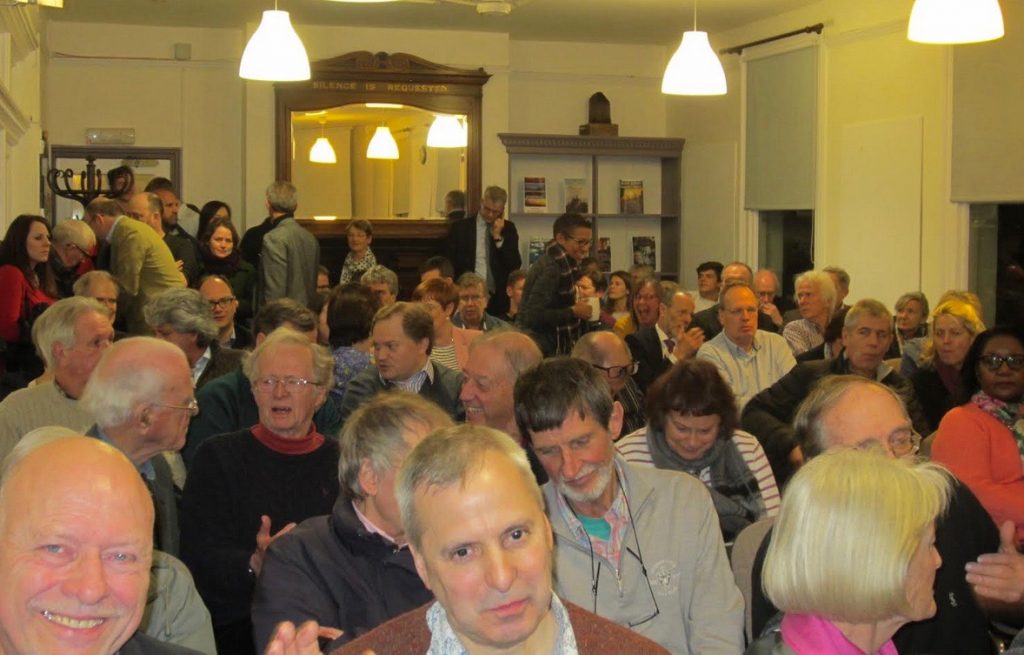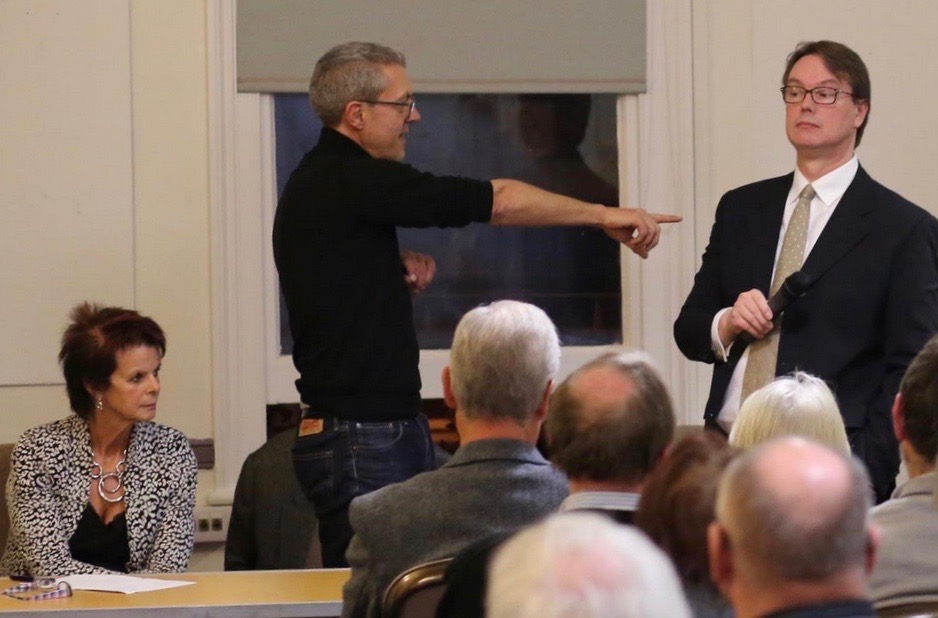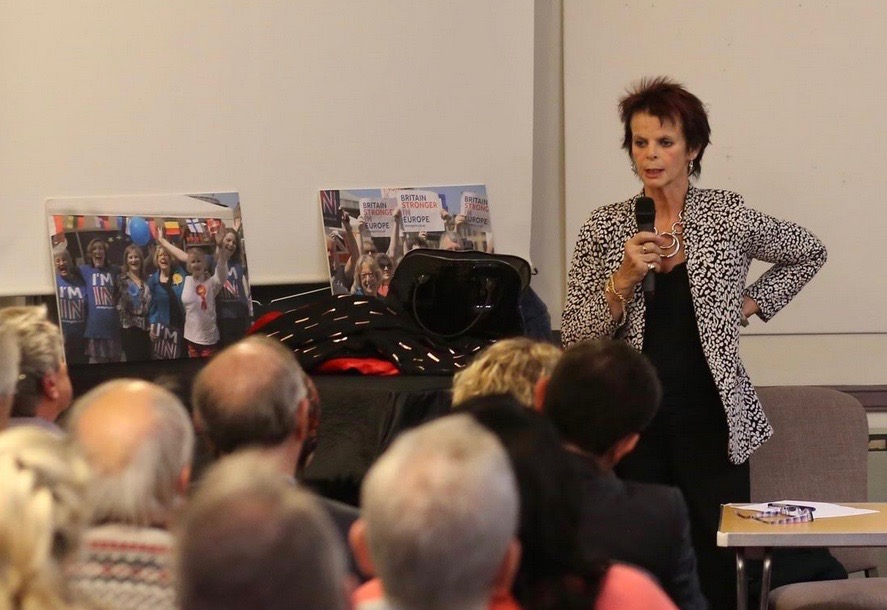 Abraham Lincoln
If given the truth, the people can be depended upon to meet any national crisis...
Abraham Lincoln
If given the truth, the people can be depended upon to meet any national crisis...
 Guildford news...
for Guildford people, brought to you by Guildford reporters - Guildford's own news service
Guildford news...
for Guildford people, brought to you by Guildford reporters - Guildford's own news service
Guildford and Woking MPs Hear Local Business Concerns Over Brexit
Published on: 6 Jan, 2018
Updated on: 6 Jan, 2018

Organiser claim 120 attended the meeting to hear local concerns over Brexit. Visible amongst the audience are: Cllrs Nils Christiansen (Con, Holy Trinity) Susan Parker (GGG, Send) and Malcolm Parry, University of Surrey.
Local businessmen were given the chance to describe the adverse effects of Brexit face-to-face with local MPs on Thursday evening (January 4, 2018) in a meeting organised by the pro-remain “Guildford & Woking in Europe”.
Meeting organisers were keen to emphasise that the meeting was not secret, as some initially reported, but was held under “Chatham House” rules allowing no remarks to be attributed. The rules were adopted in order to allow businessmen to describe the problems that Brexit was causing them, freely, without risking any resulting lack of confidence from their customers and suppliers. No press were invited.
Their views were heard by two local MPs, Anne Milton (Con, Guildford) and Jonathon Lord (Con, Woking). Milton is on record as saying she voted to Remain and Lord as voting to Leave. Remain campaigner David Pillinger chaired the meeting.
Guildford and Woking voted to Remain in the 2016 EU referendum, both with a 56% (Remain) to 44% (Leave) split.
According to meeting organiser Brian Creese: “Over 120 people packed into the Guildford Institute, keen to hear what their representatives had to say. However, the main purpose of the meeting was for the MPs to hear about their constituents actual experience of Brexit so far.
“The focus of the meeting was very much on business, and one after another business leaders from the area talked of the difficulties and frustrations of Brexit. All were struggling to recruit talent from the UK and saw applicants from the EU declining.

“J’accuse!” chairman David Pillinger seems to be saying, as he points at Woking’s MP Jonathan Lord, a Leaver.
“Some had staff leaving the UK and one talked of relocating their business to France before Brexit happens. Some of the businesses were large, some small, but the stories were the same; uncertainty and nervousness about Brexit were hitting the bottom line of business now before Brexit actually happens.
“All were nervous of a future which was as yet uncertain, and most talked of plans to set up subsidiaries in the EU. A senior consultant also talked about the impact on the NHS and reported on the collapse of nurses from the EU applying opt work in the UK, which will have devastating consequences on the performance of hospitals across the country.
“A number of young people, mainly current university students, expressed their anger at the lost opportunity for access to international jobs if we closed the doors on free movement into our own country.
“Although passions did at times rise, the meeting was, on the whole, conducted in a very orderly manner and both MPs were clearly concerned at the testimony they heard. The final plea from the meeting was that at the final vote in Parliament, our local MPs should do what is right for their local constituents, and, for this group at least, that means rejecting Brexit.
“We did not expect the MPs to come with immediate answers – we wanted them to have something to take away and think about.
“The group sees a number of ways forward. This meeting was about trying to influence local MPs to more accurately represent local opinion, both Guildford and Woking being clear Remain areas, but we also continue to canvass locally, write letters and work within all the parties to soften or mitigate the negative effects of Brexit.”
Organisers admitted that their group has a preference for Brexit to be stopped but if it is to proceed they want the settlement to retain as much of the openness and attributes of EU membership as possible. It is also intended to keep an organisational structure for campaigning purposes, that can be mobilised quickly, should a second referendum be called.
Anne Milton asked to comment on the debate and any conclusions she might have reached would only say: “My thanks to those who organised the meeting. It is always good to have an opportunity to hear people’s views.”
Responses to Guildford and Woking MPs Hear Local Business Concerns Over Brexit
Leave a Comment Cancel replyPlease see our comments policy. All comments are moderated and may take time to appear. Full names, or at least initial and surname, must be given.
Recent Articles
- Burglar Jailed Thanks To Quick Action of Ash Resident
- Highways Bulletin for December
- Birdwatcher’s Diary No.318 Some Pre-Christmas Rambles
- Merry Christmas and a Happy New Year to All Our Contributors and Readers!
- More Units Added to Solums’s Station Redevelopment
- Vehicle Stop on Epsom Road Leads to Prolific Drug Gang Being Put Behind Bars
- Local Political Leaders Respond to Publication of the English Devolution White Paper
- Flashback: Guildford All Lit Up For Christmas – Then And Now
- City Earn Themselves a Three Point Christmas Present
- Mayor’s Diary: December 23 – January 4


Recent Comments
- Aubrey Leahy on Vehicle Stop on Epsom Road Leads to Prolific Drug Gang Being Put Behind Bars
- Sheila Newton on Memories of the Dennis Bros Christmas Party
- John Perkins on Two Unitary Authorities, One Elected Mayor – Most Likely Devolution Outcome for Surrey
- Gavin Morgan on Merry Christmas and a Happy New Year to All Our Contributors and Readers!
- David Roberts on Local Political Leaders Respond to Publication of the English Devolution White Paper
- Steve Grove on Merry Christmas and a Happy New Year to All Our Contributors and Readers!
Search in Site
Media Gallery
Dragon Interview: Local Artist Leaves Her Mark At One of England’s Most Historic Buildings
January 21, 2023 / No Comment / Read MoreDragon Interview: Lib Dem Planning Chair: ‘Current Policy Doesn’t Work for Local People’
January 19, 2023 / No Comment / Read MoreA3 Tunnel in Guildford ‘Necessary’ for New Homes, Says Guildford’s MP
January 10, 2023 / No Comment / Read More‘Madness’ for London Road Scheme to Go Ahead Against ‘Huge Opposition’, Says SCC Leader
January 6, 2023 / No Comment / Read MoreCouncillor’s Son Starts Campaign for More Consultation on North Street Plan
December 30, 2022 / No Comment / Read MoreCounty Council Climbs Down Over London Road Works – Further ‘Engagement’ Period Announced
December 14, 2022 / No Comment / Read MoreDragon Interview: GBC Reaction to the Government’s Expected Decision to Relax Housing Targets
December 7, 2022 / No Comment / Read MoreHow Can Our Town Centre Businesses Recover? Watch the Shop Front Debate
May 18, 2020 / No Comment / Read More












Stuart Barnes
January 7, 2018 at 9:08 am
How utterly pathetic. Will the remoaners never accept democracy? Just get used to it – we are getting out.
Interesting that they (the remoaners) kept this meeting secret.
The organisers deny that the meeting was secret but the meeting was held under Chatham House rules so those present agreed that no remarks were to be attributable. Ed
Tom Hunt
January 8, 2018 at 12:58 pm
The usual nonsense from Mr. Barnes. He needs to understand that democracy is a process, not an event. What is undemocratic about putting ones point of view across.
If Mr. Barnes has nothing constructive to add, perhaps he should add nothing.
Martin Elliott
January 9, 2018 at 12:41 pm
Actually, referendums are not recognised by the UK “Constitution”. Introduced as a tactical measure in 1973 to address nationalism. Only 11 ad-hoc referendums have been held.
The first, at a national level, was in 1975. There are no recognised standard criteria and legally, if you read each enacting act/regulation the outcome is advisory. So an approval could be anything, 50%, 66%, whatever.
In fact, if one does want a legal comparison, look at trades union action ballot criteria.
So not only is 52%, not an overwhelming decision, it was merely advisory.
If it was a union ballot it would be an abject failure of 66% of the franchise.
If you took that criteria the exit vote is only 37%.
And as a comparable, legal criteria, isn’t it more applicable.
Paul Bishop
January 9, 2018 at 5:08 pm
And yet, despite all of your compelling and insightful points, we have triggered article 50 and are leaving the European Union. It was clearly more than advisory and clearly has some legal clout.
David Pillinger
January 7, 2018 at 10:40 am
I would like to thank all those who attended the packed meeting and also to Anne Milton and Jonathan Lord for giving up their evening to come and hear what our group had to say. I was overwhelmed by the large increase in the numbers compared to our previous meeting last year.
For the record, in the picture, I was pointing to a member of the audience to Jonathan’s left.
John Hawthorne
January 7, 2018 at 11:09 am
Could it be Freudian that both MPs wore black, as did the organiser?
Could Brexit really be that bad?
Yes, I really think it could.
Dale Miller
January 7, 2018 at 11:36 am
A striking point was made at the meeting about there being two tiers of UK citizen after Brexit as far as the job market is concerned: those with access to an EU passport through having Irish/Northern Irish or other EU close relatives, and those without.
An EU passport, of course, confers on the holder greater mobility and the chance to find a job throughout the EU. While it is likely there will be a work permit system after Brexit, why would a European employer considering a selection of equally qualified candidates choose the one with work mobility issues?
Parents hoping for the widest job opportunities for their children might like to ponder this matter and register their concern at this injustice with their local MP.
Clive Watson
January 7, 2018 at 10:56 pm
Great that local MPs came to listen. Until public opinion swings behind the demand for a second referendum, Brexit is about damage limitation.
M Smith
January 8, 2018 at 6:44 pm
Only one more referendum would solve nothing – surely to get a definitive result we’d have to make it the best of three?
John Perkins
January 8, 2018 at 9:36 am
Obviously the money these people are spending does not count as part of the campaign funding, although that’s exactly what it is.
Perhaps if they succeed in forcing their view on the majority it should be included as part of their spending on any subsequent referendum.
John Perkins
January 8, 2018 at 9:57 am
There are about 50 people in the pictures of the meeting and the maximum that can be accommodated by the Assembly Room at the Guildford Institute is 70.
Still, what price truth when one’s cause is right?
Paul Bishop
January 8, 2018 at 2:49 pm
Sounds like a room full of whining. What was this meant to achieve?
Anyway, regarding the name of the organisation, ‘Guildford & Woking in Europe’. Don’t worry, Guildford and Woking will always be in Europe – that’s a geographical fact. We won’t be in the European Union though.
John Armstrong
January 8, 2018 at 4:42 pm
The points raised and questions asked at this meeting were the same old gripes we always hear from remainers; free movement and international job opportunities for the young, mostly.
These questions have been answered so many times I don’t know why they keep on keeping on.
Once again then, before the EU, people, pop groups, ballet companies, symphony orchestras, scientists, used to travel all over Europe and the world; and people from all over the world used to come here. Travel then is not really a problem at all.
Jobs: The EU has been a great opportunity for pan-European jobs; for Europeans that is.
We are told that around 20% of university staff are from mainland Europe and overall there are about three million EU nationals working in Britain; so it’s all been great for them.
There we all were looking afar for the land of opportunity and all the time we were standing on it.
What about the other way round though? What jobs for Brits in the EU? Employers moan that British youth are not up to the jobs on offer. If that is the case because we have let our own youth down on the education front and they are not fit for a job even in their own country; what hope then for a job in someone else’s?
eWhen it come to jobs, we’re talking about graduates; not us turners of sod and diggers of ditches. Why dig a ditch in Stuttgart when you can dig one in Grimsby?
But seriously, what graduate opportunities are there for British graduates in the EU? You’re more likely to find one in China where British engineering companies have outsourced. No point in outsourcing to Germany, they pay too much.
There are quite a few German and French graduates working here though. Employees of German and French companies who have bought up much of our engineering and infrastructure during the big sell off. A goodly proportion of our rail network and power generation is owned by the French and German governments.
http://www.huffingtonpost.co.uk/2015/08/18/foreign-state-owned-railway-british-train-companies-revenue_n_8003970.html
I think remainers would be advised to think again before pushing for a second referendum or a soft Brexit.
If we had voted to stay in the EU, the first thing to go would be our rebate. Then we would get the Euro, then the EU Army and so it would go on. There would be no Status Quo.
Once we say yes, they would know finally that our resistance was broken and there would be no reason to hold back. The plunder would continue.
D Bisdee
January 9, 2018 at 10:00 am
Don’t readers love the way the Brexiters say that disagreeing with Brexit is “against democracy”? If the vote had gone the other way, just imagine the moans we would have heard from Farage et al.
Most Remainers are truly worried about the very bad effect Brexit seems likely to have on our economy and the future for our children and grandchildren, not to mention on EU citizens living in the UK and UK citizens working and living in the EU (or wishing to in the future).
I have yet to hear a Brexiter explain what exactly the benefit to the UK will be of leaving the EU. They seem to be lost for words apart from vague notions of “taking back control”.
John Perkins
January 9, 2018 at 3:13 pm
The benefits of leaving were clearly expressed during the debate that preceeded the referendum. There is little point in repeating them.
Attempting to frighten the children with bogeymen is not a substitute for rational argument.
Nor are counterfactuals.
Pete Brayne
January 9, 2018 at 5:54 pm
NB I think Chatham House has just the one rule!
John Robson
January 10, 2018 at 11:20 am
I didn’t vote for Brexit, but the benefit maybe is that one day we’ll have a diverse economy like Germany, France or Italy, where the masses are not forced to gravitate towards the capital in search of opportunities.
One, where our entire economy is not held to ransom by the financial services sector.
Wwhere instead of million-pound bonuses for the few we may not have a million people employed on zero-hour contracts.
Industrial inertia will force the Government to stimulate growth and incentivise investment, we are already a cheap labour resource compared to the rest of Western Europe.
Maybe like those three EU countries we’ll one day have a diverse economy which offers opportunities and real jobs to the whole of the UK, not just London and the South East.
And if we were part of this European utopia, why didn’t we benefit from the social chapter which offers far reaching employment protection? Meaning people do not live in constant fear of the sack while living just above the breadline?
The social chapter doesn’t appear to be too expensive for Germany, Italy or France, and having lived in two of those countries, believe me, the security of employment and thus the quality of their European lives is far superior to that of the UK.
Why bother being part of the club if we don’t enjoy parity with our other partners? Why do we continue to subsidise their industries and social welfare systems when ours are in deep decline and / or breaking point?
May be a rocky few years, but I don’t believe its xenophobic to put the interests of the UK first for a while.
Jim Allen
January 11, 2018 at 12:34 am
Time the remoaning team got with the programme.
The latest figures show we are doing quite well, thank you.
Arnold Pindar
January 11, 2018 at 10:10 am
I note that “local businessmen were given the chance to describe the adverse effects of Brexit” at the meeting held on 4th January.
Through the National Consumer Federation, I am looking at the impact of Brexit on consumers, what we must protect and what opportunities may result from the referendum decision.
Consumers account for 86% of the UK economy (private and public sector). It is essential that our voices are heard and influential in framing the solutions to the many and complex issues that face us as we leave the European Union.